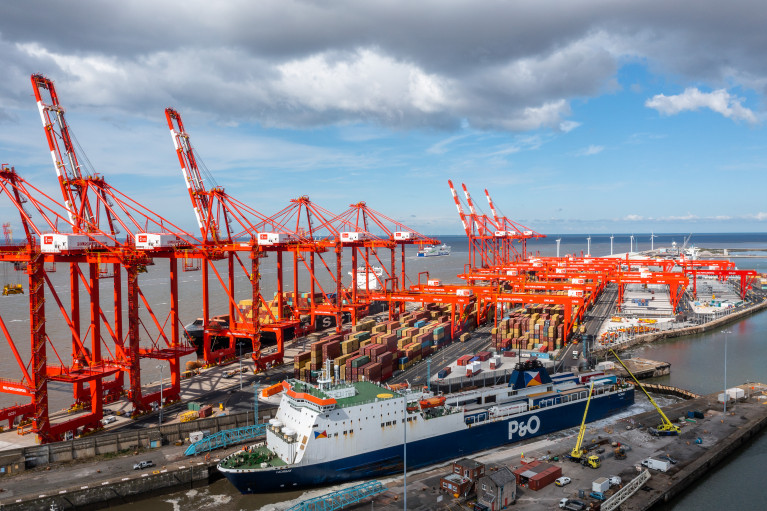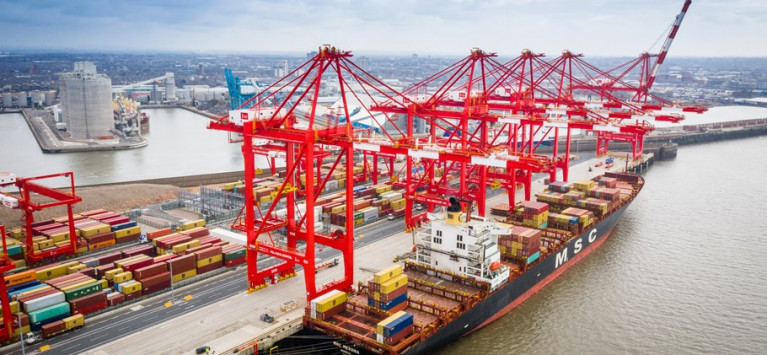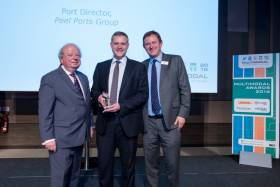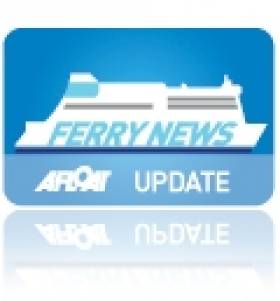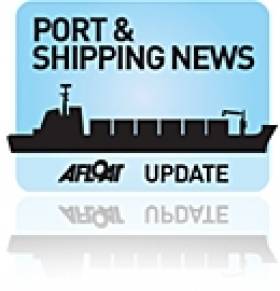Displaying items by tag: Peel Ports
Ports Group in UK Commits to Net Zero Emissions by 2040
The Peel Ports Group (see stake deal) has committed to becoming a net zero port operator by 2040, a decade ahead of the UK Government’s national decarbonising targets.
The UK's second largest port operator, headquartered in Liverpool, owns some of the UK’s largest and most important ports including the Port of Liverpool, Clydeport and London Medway, and is the first major port group to convey such ambitious plans towards tackling climate change.
The group has unveiled a number of initiatives and investments to help drive a more sustainable agenda and reach the net zero milestone by 2040 across all of its locations in the UK and Ireland (Dublin Port's MTL Terminals adds Afloat).
As part of COP26, Peel Ports Group is hosting two workshops at the International Maritime Hub, in collaboration with the British Ports Association, the UK Major Ports Group, Maritime UK and City of Glasgow College.
By the end of this year, Peel Ports aims to have 50% of its vehicle fleet replaced with electric cars, with the remainder in place by December 2022, and is currently undergoing trials of greener fuels and electric alternatives for the future of its operational machinery and equipment.
The port operator views investment as being the key to resiliency and has been passionate about developing a sustainable future for the supply chain for many years.
Peel Ports has invested over £1.2 billion across the last decade on sustainable infrastructure and technology to future proof its operations including the delivery of energy efficient cranes, LED lighting and choosing sustainable, low emission equipment and suppliers.
Mark Whitworth, CEO of Peel Ports said: Our ports provide critical infrastructure as the UK’s gateways for food, medical, energy and fuel supplies. It is therefore important that as a responsible business we incite positive change in the UK’s logistics market to tackle climate change
“We understand and acknowledge our responsibility to minimising the environmental impact of our operations for the benefit of the planet, while also ensuring the smooth continuation of the supply chain”
“Our vision for the future of our business, our people, our customers and our communities is ambitious. Ultimately, our net zero plans will work towards achieving long-term sustainable growth that has a positive impact on the environment, as well as regional and local economies for generations to come.”
The port operator is also promoting the benefits of ports closer to the end destination, in order to reduce emissions, as well as introducing major new rail services for better connectivity, taking tonnes of freight off the road.
It will also continue to support the changing energy markets with both offshore and onshore wind sites available across its various locations.
Furthermore, in order to future-proof its carbon neutral needs, the group has also created an Innovation Forum which seeks to answer some of the biggest questions around the reduction of emissions. The forum tracks down answers from universities, entrepreneurs and start-ups, which in turn pitch their ideas and solutions. The best of these can be deployed at scale with the necessary investment from the business.
Across the Irish Sea from Dublin Port is the Port of Liverpool’s deep water container terminal, Liverpool2 where recently a new record was broken at the north-west England port.
The record goes to containership MSC Federica which berthed last month to exchange 5,452 TEUs, the highest number seen from a single vessel in Liverpool since the terminal opened in 2016.
The containeship is part of operator, MSC’s Turkey-Canada service which has seen remarkable success and includes calls at Montreal, Liverpool, Sines, Valencia, Barcelona and Tekirdağ amongst other terminals. This service directly links Liverpool to the Far East.
Its arrival signifies the current strength of the UK port on the global trading stage. In 2016 the Port of Liverpool's owner Peel Ports invested £400m into the container terminal, enabling it to handle the largest ships in the world while maintaining other port operations and productivity levels as normal.
As one of the most operationally efficient and modern terminals in Northern Europe, the deep-water terminal offers ‘future-proof’ facilities, enabling global shipping firms’ reliable access to major import and centres at the heart of the UK.
David Huck, Managing Director at Peel Ports, said: “This record is a testament to the investment we’ve put in to ensure state-of-the-art technology, including our five ship to shore cranes (STS) and twelve cantilever rail mounted gantry cranes (CRMG) to help make our world-class staff as efficient as possible. At difficult times like these, businesses want to know that their supply chains are able to cope with the increased demand and this demonstrates that the Port of Liverpool is ready to meet their needs.”
Peel Ports, in conjunction with global terminal business Terminal Investment Limited Sarl (TiL), is continuing to develop the deep-water terminal.
The next phase of growth has seen the arrival of a further three STS cranes which are being commissioned and will soon see a further 10 CRMG cranes which will increase the capacity of the terminal significantly, making it capable of managing the unloading of two 380m vessels simultaneously.
Work on this second phase of the project has already started and is expected to be completed during 2021.
#MultimodalAward - UK based Peel Ports Group, owner and developer of the Liverpool2 container terminal, was recognised as logistics business of the year at the annual Multimodal event held in Birmingham.
The company that also operates the MTL Terminal in Dublin Port (see large containership caller), topped the Exhibitor of the Year category, which recognises business excellence, ahead of other highly commended transport and logistics entries from across the UK.
Now in its ninth year, Multimodal is the UK and Ireland’s premier freight transport, logistics and supply chain management event and is held in partnership with the Chartered Institute of Logistics and Transport and the FTA (Freight Transport Association).
The group, which also owns and operates Manchester’s Port Salford warehouse and distribution centre, was recognised by Multimodal judges for its progressive and innovative approach, as well as for its ambitious development plans across the North-west.
One of the UK’s largest port groups, Peel Ports is currently constructing its £300m landmark terminal expansion project, Liverpool2. (see delivery of giant container gantry cranes). The first phase of the new terminal will be fully operational in the autumn.
Once complete, Liverpool2 will create a state-of-the-art freight gateway as the UK’s most centrally-located, deep-water container terminal and will offer import and export companies located in the North-west of the UK ‘ship-to-door’ solutions via sustainable transport routes such as the Manchester Ship Canal.
David Huck, Port Director at Peel Ports, said: “To be recognised as the Exhibitor of the Year at this year’s Multimodal caps off what has been great 12 month period for the company. With the imminent opening of Liverpool2 and Port Salford we are very much looking forward to the year ahead.
"These annual awards allow the industry to gather and discuss what’s happening in logistics and what the next stages of multimodality are in the pipeline across the UK. It is a great honour to be recognised by our peers as delivering an exceptional business model driving interconnectivity across the country.”
Abbie McGuffie, Multiuser Warehouse Contracts Executive, at Peel Ports was also highly commended in the Young Logistics Professional of the Year category which recognises people under 32 in the industry with a proven track record.
Liverpool2’s waterway connections to Port Salford, as a port centric logistics hub, will also position Liverpool2 as the UK's first "green logistics hub" with the potential to further reduce transportation costs, congestion and carbon footprint for businesses importing and exporting to and from the North West of England.
#CanalCruises – Operators of the famous ferry cross the Mersey will again be launching Manchester Ship Canal Cruises starting in early April, writes Jehan Ashmore.
Treat yourself to the leisurely 6 hour return cruise along the 35 mile canal. To wet your appetite click HERE for a taster of the passage by viewing the Mersey Ferries TV Advert.
The canal cruise can start at Salford Quays (M50 3AH); or at the opposite end of the route from either our Seacombe (Wirral CH44 6QY) or Liverpool (L3 1DP) terminals.
Take in the spectacular scenery whilst a live commentary tells the story of how this magnificent waterway shaped the city of Manchester and the North West of England.
Over the passage of time, Runcorn (near the start of the canal) and Salford Docks where locations for the discharging of Guinness.
The 'black-stuff' was transported across the Irish Sea by the last of the stout-tankers The Lady Patricia and Miranda Guinness.
The trade ceased two decades ago in 1993 following the introduction of road-stout tankers that take the ferry instead.
Another Irish Sea route connection to Dublin Port had up untill recently operated two container vessels from Liverpool, however one of these ships, Coastal Deniz has shifted to a newly upgraded domestic service.
The service which is operated by this larger container vessel is running between Liverpool's Seaforth Container and the Irlam Container Terminal, near Trafford Park in Manchester.
Due to a marked increase in trade along the canal from customers among them Kelloggs, a trail-run period in running Coastal Deniz during January had proved successfull, leading to the transfer of the 260 TEU capacity vessel operated by Peel Ports.
The deployment of the 1991 built vessel to the canal route will move in the region 20,000 containers during 2013. The service between Liverpool to Irlam will operate four times weekly. For more WorldCargoNews.com has a report.
Once you've finished your day of cruising, Mersey Ferries we'll return to your point of departure by dedicated bus transfer.
Tickets are available from only £36 per person. Advance booking is necessary. To book or for more information call 0151 330 1444 or visit this LINK.
Birkenhead Docks Upbeat On Future Growth
#PORTS – The operator of Birkenhead Docks at Twelve Quays Terminal, says it is confident it will recover the business it lost when DFDS Seaways closed down ferry operations last year, according to a report in today's Liverpool Daily Post.
Birkenhead Port, part of the Peel Group, says overall tonnage for the year to March stood at 3.2m tonnes – down 3% on the previous year. It said the fall was due to DFDS's decision to shut its Birkenhead-Dublin routes in January, 2011 (click HERE).
In accounts newly filed at Companies House, Birkenhead Port said business for the first ten months of the year had been strong. But it said that, in the final quarter, ongoing growth on its Belfast route was "more than offset by the loss of all Dublin volume".
It added: "While, in the short term, the loss of the DFDS business will adversely impact revenues and overall financial result, in the medium term the directors are confident that the company will recover this lost business as we look to contract with another operator at this flagship, purpose-built roll-on, roll-off facility."
It said that, with Stena Line axing its Fleetwood-Larne service, Birkenhead could attract more business to its Belfast route.



























